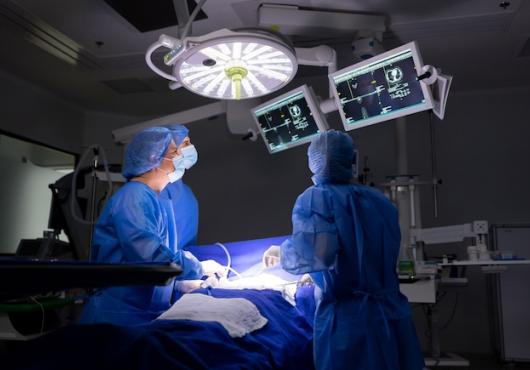
The health care landscape has changed rapidly over the past decade, ushering in a new era of medical education. Evidence-based innovations are enhancing teamwork, fostering interdisciplinary collaboration, and integrating advanced technologies like AI to reshape how clinicians and educators prepare for the future. Amidst all this change, medical educators play a critical role in ensuring that the next generation of health care providers will be prepared to meet today’s demands and adapt to tomorrow’s needs.
Preparing Educators to Practice the Medicine of Tomorrow
“Our approach to medical education is no longer about replicating what’s been done before; it’s about shaping what comes next,” says David H. Roberts, MD, dean for external education at Harvard Medical School. “Medical educators are increasingly tasked with anticipating change so that their trainees are not only capable in the present but are prepared to be resilient and flexible in an evolving field.”
Sarah K. Wood, MD, faculty director of the Harvard Macy Institute, agrees. “Educators today need to foster adaptability. This means teaching learners not just to react but to respond thoughtfully in the face of change, preparing them to practice the medicine of tomorrow.”
Key Trends in Medical Education Today
Both Roberts and Wood see medical education as a driving force in shaping the future of health care. New trends and educational strategies are emerging that empower learners, equip educators, and foster a resilient workforce ready to address the complex needs of modern health care.
Trend #1: Embracing Collaboration, Innovation, and Diversity
“Medical education today thrives on collaboration,” Roberts explains. “Gone are the days of didactic, one-way lectures from textbooks. Instead, learning has become an active, shared experience where everyone participates, debates, and collaborates.” Case-based collaborative learning, an approach developed at Harvard Medical School (HMS), invites students to practice skills in consensus-building and teamwork—expertise that is essential for delivering responsive, high-quality patient care. Cognitive science research shows that interacting and grappling with material creates more durable learning.
Wood also underscores the importance of interdisciplinary learning, both in the content covered and the perspectives represented. “Our learning environments are enriched by diverse voices across disciplines, specialties, and backgrounds. This diversity encourages learners to develop critical skills in communication, relationship building, and collaborative problem-solving, all crucial for addressing complex health care challenges.”
Trend #2: Building Flexible, Personalized Learning Platforms
Reflecting on her own experience, Wood recalls, “Early in my career, teaching was something I did without formal preparation. Today, faculty development is essential for preparing educators to train learners in more complicated and integrated settings.” She is proud of how the Harvard Macy Institute programs provide health professions faculty with opportunities to develop their skills as educators, innovators, leaders, and systems thinkers so that their curricula and programs are responsive to learner, institutional, and societal needs.
Roberts notes that educational offerings are no longer one-size-fits-all. “Meeting students where they are along their educational continuum is an increasing focus,” he says, “and ‘precision education,’ a trend in personalized and data-driven learning, provides learners with ongoing feedback on their strengths and areas for growth, so they can tailor their learning effectively.” By prioritizing flexibility, customization, and data-driven insights, today’s educational platforms empower learners to actively pursue their own development, ensuring that they are prepared to navigate the demands of a rapidly changing health care environment.
Trend #3: Integrating Advanced Technologies into Education
Technology is a game-changer in medical education, and generative AI is at the forefront. “AI holds vast potential to enhance learning by summarizing content, generating individualized practice questions, and offering automated, interactive tutoring that helps students reinforce their knowledge more efficiently,” says Roberts. “An AI ‘tutor bot’ is already in development at HMS.” However, he highlights the importance of balance between innovation and oversight. “While AI can significantly augment learning, it should complement—not replace—the essential human elements of teaching and patient care.” Wood echoes this sentiment, seeing AI as a collaborative partner in education. “We’re building the plane while we’re flying it, exploring AI’s possibilities while ensuring that critical thinking, relational connectedness, and the cognitive development of our learners remain top priorities.”
Both Roberts and Wood advocate for a thoughtful approach to AI’s transformative potential, considering both its benefits and limitations. They encourage educators to engage with generative AI and attend courses to get hands-on practice, as these tools are poised to play an increasing role in clinical and educational environments. The Harvard Macy Institute has integrated opportunities to learn about AI across its programs, with the Transforming Your Teaching Using Technology program in particular focused on harnessing the power of novel AI platforms to advance health education.
The Future of Medical Education
Roberts sees the future of medical education as one that thrives on diverse perspectives and a commitment to innovation. “When more voices are at the table, we can better tackle the tough challenges facing health care,” he says. Wood adds, “Our success depends on our willingness to continually learn and grow.” Both leaders are passionate about supporting, developing, and connecting health professions educators globally through Harvard Medical School and Harvard Macy Institute offerings.
Preparing the future health care workforce is a significant responsibility, requiring ongoing investment in professional development and educational advancement. By fostering collaboration, applying personalized learning approaches, and integrating emerging technologies like AI, medical educators are paving the way for future generations of health professionals to meet the dynamic needs of patients and communities.


